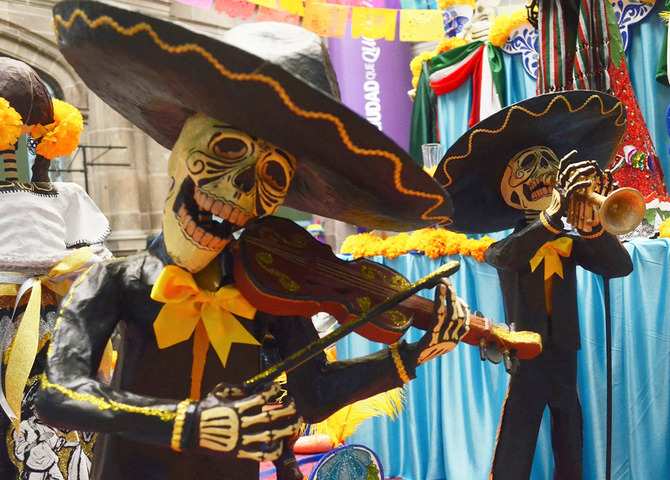The custom has its roots in the ancient Celtic holiday of Samhain when people would dress up and build bonfires to fend off ghosts. Pope Gregory III established November 1 as a day to celebrate all saints in the ninth century. Soon, elements of Samhain’s customs were absorbed into All Saints Day.
Table of Contents
Origin of “Halloween” according to the Bible
Why do we have Halloween? Pope Gregory III later moved All Saints’ Day to November 1 to provide a Christian alternative to this pagan holiday. Pope Boniface IV established All Saints’ Day around AD 600. Christians who preferred not to observe pagan holidays did so by honoring the saints and martyrs, a celebration of spiritual virtue.
All Saints Day evolved into a major feast as Christianity spread significantly throughout Europe. Christians who preferred to observe positive spiritual values instead of pagan holidays did so.
The Day before All Saints Day, known as “All Hallow Evening,” gave rise to the name “Halloween,” which was then abbreviated to “All Hallow’s Eve” or “All Hallow’s Even.” Over time, the term evolved into “Hallowe’en.”
A few hundred years later, the Roman Catholic Church declared November 2 to be All Souls Day in remembrance of the deceased. This might have been influenced by the ancient Irish, Scots, and other European peoples’ continuous observance of the Day of the Dead.
In opposition to this, many Protestant Christians observe October 31 as Reformation Day to celebrate the reformers who led the Reformation in the 1500s, including Martin Luther, John Calvin, and others. This is all about the name and the origin of Halloween, according to the Bible.
There Are “Days of the Dead” in Other Cultures

Although many claim that Halloween’s modern origins may be traced back to Samhain, it is important to recognize that many civilizations worldwide also observe “days of the dead” that occur at the end of summer and fall and are frequently marked by sacrifices.
There seem to be so many similarities for these identical festivals to be coincidences. For instance, the Mexican Day of the Dead (El Da de Los Muertos) originated in the Americas and is based on the older Olmec and Aztec festivals honoring the deceased.
This is perhaps where the Day of the Dead tradition in Guatemala originated.
Brazilians additionally observe Finados (Day of the Dead). The Day of the Skulls (Da de Los Natitas) is celebrated in Bolivia.
Similar celebrations are celebrated across Asia. For instance, the Chinese observed the Ghost Festival, a day honoring departed ancestors. Similar festivities were observed by the Japanese as O-bon or simply as Bon.
Even the Ghost Festival has a Vietnamese counterpart named Tet Trung Nguyen. In Korea, rituals honoring departed ancestors are performed during Chuseok or Langkawi. GiaJatra, a cow pilgrimage in Nepal, is held in memory of recently departed people.
The Day of the Dead is a feast celebrated in the Philippines where tombs are cleaned and painted.
The Day may have been chosen by God going back to earlier events, as noted by renowned Bible historian Archbishop Ussher (the approximate Day Adam and Eve sinned, according to Ussher’s calculations, and God’s successive covering of their nakedness with animal skins).
Though the origin of this festival, specifically for the Israelites, can indeed be traced to Moses, the Day could have been chosen by God going to the preceding event.
What Is the exact origin of Halloween according to the Bible?
What is the meaning of Halloween? Many Christians consider taking part in Halloween to be doing anything evil and dark, something that Scripture forbids: let’s see what the origin of Halloween according to the Bible.
Avoid joining in with their activities. You used to be completely in the dark, but the Lord has given you light now. Therefore, lead a life of light! Because this light within you only manifests what is real, good, and right. Think carefully about what the Lord will appreciate.
Avoid participating in the pointless actions of evil and darkness; instead, call them out. Even bringing up the things that immoral people do in secret is dishonorable.
But when the light falls on them, everything will be visible, and their terrible intentions will be revealed. The phrase “Awake, O Sleeper, Rise from the Dead, and Christ Will Give You Light” describes this situation. So, be cautious about how you live.
On the other hand, many believers view most modern-day Halloween celebrations as harmless entertainment. Some claim that some Christians are trying to distance themselves from the world by condemning Halloween.
Halloween is not exactly an evangelical holiday, nor is it ignoring it or exclusively enjoying it with Christians. According to Scripture, Christians have to “become all things to all men so that by all feasible means” they may save some (1 Corinthians 9:22).
Christians who oppose Halloween associate it with witchcraft and support their position with texts like these:
Leviticus 18:10–12
Never, for instance, offer your son or daughter a burnt offering. And do not permit your people to indulge in witchcraft, fortune-telling, sorcery, omen interpretation, spell casting, medium or psychic work, or summoning the spirits of the dead. Anyone who engages in these behaviors is hated and despised by the Lord. (NLT)
These words clearly state what a Christian ought to refrain from doing. But how many Christians hand up their kids on Halloween as burnt offerings? How many people are summoning the ghosts of the dead? Numerous texts in the Bible condemn pagan traditions, but none directly forbid Halloween.
Reconsidering Halloween
What does Halloween mean in the Bible? Why are Christians present in this world? Are we meant to reach out to a world full of perils and be the light of Christ, or are we here to dwell in a safe, sheltered environment, guarded against the ills of the world?
And how do we communicate with non-Christians in a way that will inspire them to accept Jesus Christ as their Savior? Guys from all over the world come to our door on Halloween. Our neighbors are more active on the streets during Halloween. The trip is a fantastic chance to meet new people and spread our faith.
Is it possible that we end up alienating the same individuals we’re trying to reach by criticizing Halloween? Can we exist in the world while remaining outside of it? This is the origin of Halloween according to the Bible and by other cultures as well.


